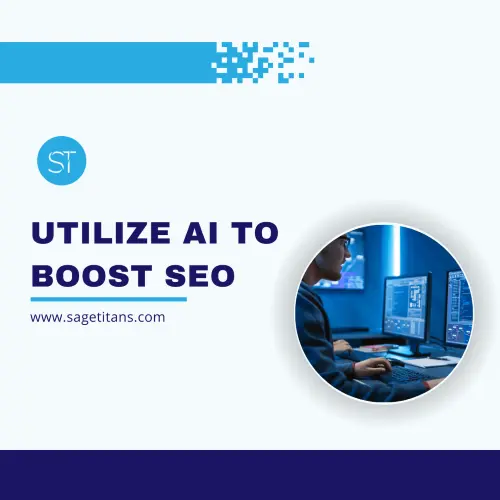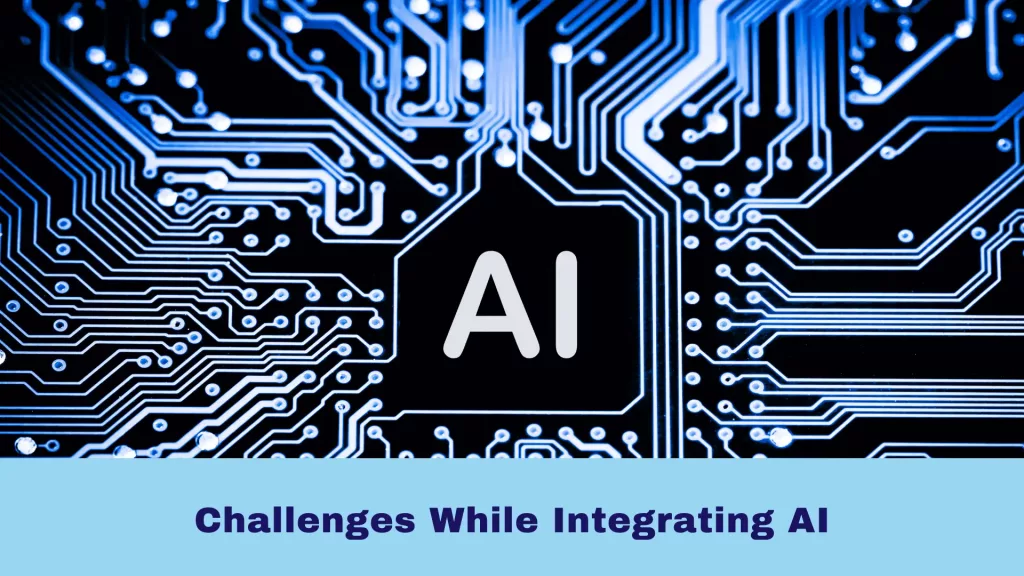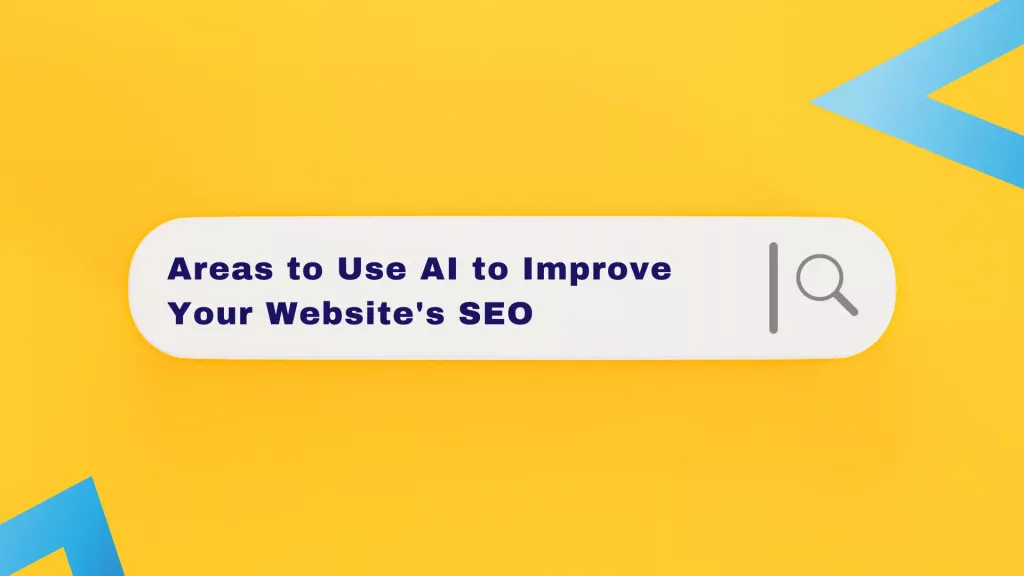How To Utilize AI
To Boost SEO In 2024?
18-March-2024

Table of Contents
Introduction to SEO
SEO, or Search Engine Optimization, is the process of improving your website’s exposure in search engine results pages (SERPs). When individuals search for information online using keywords or phrases, search engines such as Google, Bing, and Yahoo return a list of relevant websites.
The purpose of SEO services is to ensure that your website appears higher in the search results, increasing the likelihood that consumers will click on it. This is accomplished through a variety of tactics, including producing high-quality content, optimizing your website’s structure and code, and establishing links from other websites.
SEO is vital because it drives organic traffic to your website, which means that visitors who find it via a search engine are more likely to be interested in your products or services. By optimizing your website for search engines, you may boost your online exposure, attract more visitors, and eventually grow your business.
SEO Current State

The present state of SEO emphasizes user experience, content quality, and technological optimization. Search engines such as Google prioritize websites that deliver quality, relevant material to visitors while also maintaining a consistent browsing experience across devices. Mobile-friendliness, site speed, and security are critical considerations for ranking high in search results.
Furthermore, there is a rising emphasis on natural language processing and understanding user intent, resulting in more conversational searches and a demand for material that answers specific inquiries. AI and machine learning are important in SEO because they enable the analysis of massive amounts of data and the optimization of methods for improved search exposure.
Overall, SEO has evolved into a more comprehensive strategy that combines technical expertise with user-centric content production and optimization.
Introduction To AI
Artificial intelligence (AI) is a field of computer science that focuses on developing machines and systems that can do activities that would normally need human intelligence. These activities include experience-based learning, pattern recognition, decision-making, and natural language comprehension.
AI is a vast field with many subfields, including machine learning, natural language processing, computer vision, and robotics. AI technologies are being employed in a variety of industries, including healthcare, banking, transportation, and entertainment, to automate procedures, increase efficiency, and solve complicated issues.
As AI advances, it is projected to have a significant impact on society, transforming how we work, live, and interact with technology.
Integration of AI in SEO
The use of AI in SEO has transformed the way webpages are optimized for search engines. AI-powered tools and algorithms are used to evaluate massive volumes of data, such as user activity, search patterns, and competition strategies, to find trends and insights that can help SEO campaigns.
Natural language processing (NLP) helps to better understand user searches, resulting in more relevant and targeted content development. AI also plays an important part in on-page SEO, assisting with the optimization of meta tags, headers, and pictures for improved search visibility.
Furthermore, AI can be applied in link-building techniques, content development, and performance tracking, allowing SEO experts to make data-driven decisions and improve their results. Overall, the use of AI in SEO has increased the efficiency, effectiveness, and impact of increasing search engine ranks and driving organic traffic to websites.
Benefits In Integration
There are various advantages of AI in SEO.
Improved User Experience
AI may evaluate user behavior and preferences to provide a more personalized and engaging experience, potentially leading to increased user satisfaction and longer visit durations.
Better Content Optimization
AI-powered technologies can analyze massive volumes of data to uncover trends and insights, allowing for more relevant and tailored content that connects with users and ranks better in search results.
Enhanced Keyword Research
AI can help uncover trending keywords and themes, allowing for more effective keyword targeting and content development.
Improved Decision Making
AI can provide significant insights and recommendations based on data analysis, allowing SEO professionals to make more educated decisions and improve their strategies for greater success.
Competitive Advantage
Businesses that use AI can stay ahead of the competition by quickly adjusting to changes in search engine algorithms and applying new techniques to boost website performance.
Challenges While Integrating AI

While incorporating AI into SEO has significant benefits, there are several issues to consider:
Complexity
Many firms and SEO professionals find it difficult to implement AI in SEO since it takes a thorough understanding of both AI technologies and SEO concepts.
Cost
Creating and executing AI-powered tools and tactics can be costly, particularly for small organizations with limited resources.
Data Privacy and Security
AI relies on massive volumes of data, which raises privacy and security problems. Maintaining compliance with legislation such as GDPR can take time and effort.
Skill Gap
AI necessitates specialized skills and knowledge, which may not be easily available in many firms. Training employees or employing AI experts can be complex and pricey.
Algorithm Changes
Search engine algorithms are continually evolving, and AI-based techniques must adjust accordingly. Keeping up with these developments might be difficult.
Ethical Concerns
AI introduces ethical concerns, such as algorithm prejudice and the risk of misuse. Ensuring ethical AI techniques is critical, but can be difficult to achieve.
Integration with Existing Systems
Introducing AI into existing SEO systems and workflows can be difficult and may necessitate considerable modifications to infrastructure and operations.
Utilize AI to boost SEO

Using AI to improve SEO in 2024 entails employing cutting-edge technology and tactics to increase your website’s exposure and rating in search engine results pages (SERPs). Here are some ways to do this:
AI-Powered Content Creation
Utilize AI tools to create high-quality, relevant content for your website. These tools can help you write search engine-optimized articles, blog posts, and other content.
Natural Language Processing (NLP)
Use NLP to comprehend user intent better and generate content that fits what users are looking for. This can help you achieve higher ranks for related keywords.
Voice Search Optimization:
As voice search becomes more popular, be sure your content is optimized for it. Use artificial intelligence to evaluate voice search patterns and generate content that addresses frequent voice search questions.
AI-Powered Keyword Research
Use AI techniques to uncover relevant keywords and subjects that are currently trending in your sector. This might help you develop content that will rank higher in search engines.
Automated SEO Audits
Use AI-powered technologies to do routine SEO audits on your website. These tools can discover issues that are hurting your rankings and make suggestions for change.
Personalization
Use AI to customize content for different audience segments. This can help to increase interaction and ultimately boost your SEO efforts.
Predictive Analytics
Use artificial intelligence to evaluate data and forecast future trends in search engine algorithms. This allows you to keep ahead of the curve and change your SEO strategy accordingly.
AI-Powered SEO Tools
Use AI-powered tools to track your website’s performance in real-time and alter your SEO approach as needed. These tools can provide useful information about how your website works and what adjustments might be made.
Areas to Use AI to Improve Your Website’s SEO

Keyword Research
AI can assist in identifying relevant keywords and topics that are consistent with user intent and search trends. By evaluating massive volumes of data, AI can provide significant insights into optimizing your keyword approach for improved SEO success.
On-Page Optimization
AI may examine your website’s content and structure to suggest opportunities for on-page optimization. Optimizing meta tags, headers, and picture alt language can help your website rank higher in search results.
Natural Language Processing (NLP)
Use NLP to better comprehend user queries and provide content that matches their intent. Using NLP, you can optimize your content for long-tail keywords and conversational search questions, increasing your chances of ranking high in search results.
Content Creation
Use AI-powered tools to create high-quality, SEO-friendly content at scale. These technologies can monitor trends, user behavior, and competition strategies to provide compelling and relevant content that ranks high in search engine results.
Voice Search Optimization
As voice search becomes more prevalent, AI can help you optimize your content for voice queries. By researching voice search patterns, AI can assist you in developing content that is more likely to appear in voice search results.
User Experience Optimization
Artificial intelligence (AI) may monitor user behavior on your website to find areas for improvement. You may boost your website’s SEO effectiveness by increasing user experience factors such as site speed, mobile friendliness, and navigation.
Performance Tracking & Reporting
Use AI-powered tools to watch your website’s performance in real-time and generate reports that help you understand your SEO efforts. By tracking key data like traffic, rankings, and conversions, AI can help you find areas for development and modify your SEO strategy to get better results.
Backlink Analysis
Use artificial intelligence to examine your backlink profile and uncover possibilities to develop high-quality backlinks. By assessing criteria such as authority, relevancy, and anchor text, AI can assist you in developing a more effective backlink strategy to increase your website’s SEO.
Competitor Analysis
AI may examine competitor websites to determine their SEO methods and results. By learning about rival strategies, you may improve your SEO approach to stay ahead in search engine results.
Structured Data Markup
AI can assist you in implementing structured data markup on your website, hence increasing its exposure in search results. Using AI to apply structured data can improve the appearance of your website in search results, thereby increasing click-through rates.
Summing up
Finally, using AI in SEO provides numerous benefits for firms trying to increase their online presence and rankings in search engine results. Businesses that employ AI-powered tools and techniques can improve their content development, keyword research, on-page optimization, and user experience, resulting in improved search rankings and more organic traffic.
AI also delivers vital insights and recommendations, allowing organizations to make better decisions and stay ahead of the competition. To ensure authenticity and relevance, organizations must establish a balance between AI and human integrations with SEO efforts for the online business.
Partnering with a digital marketing firm may assist organizations in negotiating the difficulties of AI integration in SEO and ensure that they are using the benefits of both AI and human skills to obtain the best outcomes from their SEO efforts.

We use cookies to improve your experience on our site. By using our website, you’re agreeing to the collection of data as described in our Privacy Policy.